Family Life
The Phillips/Read/Hayward family 1920's to 1980's
Written by Mary Hayward in 2001.
Note: These are extracts from Mary's memories recalling life in Broadwey and Nottington from the 1920's to the 1980's.
My grandson, Mark Read said one day, Nan why don't you write a story of your life and all the things you have done over the years. So here I am sat at my desk in my little work room on a Sunday morning in March 2001. A miserable morning, it's raining and I can't see the distant hills.
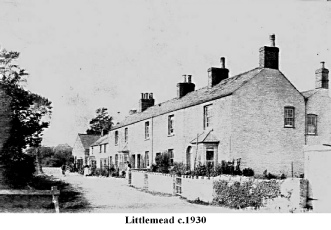 I was born in a small cottage, Number 7, Littlemead in the village of Broadwey on May the 9th 1925; the only child of Ivy and Ernest Phillips. The cottage has since been demolished and a new house built. My father worked on a local farm, starting by delivering milk and later cleaning the bottling in the small dairy. My mother stayed at home to look after me, not many women went out to work in those days.
I was born in a small cottage, Number 7, Littlemead in the village of Broadwey on May the 9th 1925; the only child of Ivy and Ernest Phillips. The cottage has since been demolished and a new house built. My father worked on a local farm, starting by delivering milk and later cleaning the bottling in the small dairy. My mother stayed at home to look after me, not many women went out to work in those days.
My early childhood as I can remember was very happy, playing in the lane with other children. Two names I remember especially were Lily Summers, a little older than I was and Ivor Forsey who my mother took out with me in the pram for walks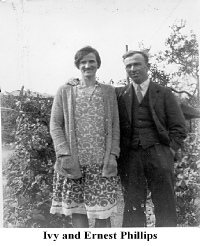 as his mother had died when he was born and his Gran brought him up.
as his mother had died when he was born and his Gran brought him up.
During my early childhood I can remember having tea parties with the children whilst the mums' sat under the tree that was opposite where I lived at number 7, very peaceful and sunny hot summers.
I started school at Broadwey when I was four years old and I can remember crying to go with the other children. It was safe in those days for the older children to take you to school as there were few cars on the road. On a fine day we went across the field and up Mill Street, which brought us out opposite the school. The headmaster when I started school was Mr John Peglar with teachers, Miss Ward, Miss Lane and Miss Knight. After the retirement of Mr Peglar, Mr Coombes became the headmaster.
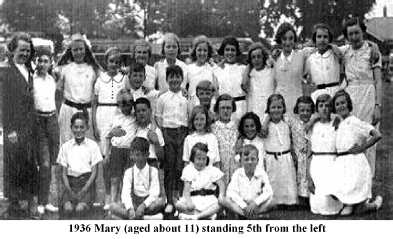
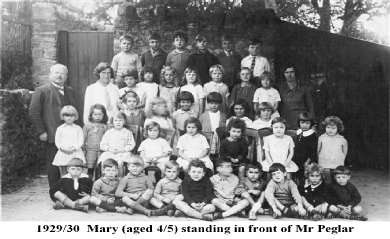 I left Broadwey school when I was eleven and went to the Central Girls School at Westham, Weymouth. During the winter, I went by train on the Abbotsbury line, which I caught at the small station in Broadwey. I can recall happy times with all the boys from Abbotsbury and Portesham going to the Grammer and Central schools in Weymouth. It was a long walk from the station in Weymouth to and from the school each day. We were allowed out 10 minutes early, if not we missed the train. During the summer months, I cycled to school, usually going down Radipole Park Drive, sometimes I came home at lunch time and then cycle back to school for the afternoon, a three mile trip each way. I played hockey at school, I always played in goal. I enjoyed cookery lessons, and won a cookery prize in 1938, Mrs Beatons Cookery Book. I couldn't have been too bad a pupil, as I had a prize each year whilst at Central School.
I left Broadwey school when I was eleven and went to the Central Girls School at Westham, Weymouth. During the winter, I went by train on the Abbotsbury line, which I caught at the small station in Broadwey. I can recall happy times with all the boys from Abbotsbury and Portesham going to the Grammer and Central schools in Weymouth. It was a long walk from the station in Weymouth to and from the school each day. We were allowed out 10 minutes early, if not we missed the train. During the summer months, I cycled to school, usually going down Radipole Park Drive, sometimes I came home at lunch time and then cycle back to school for the afternoon, a three mile trip each way. I played hockey at school, I always played in goal. I enjoyed cookery lessons, and won a cookery prize in 1938, Mrs Beatons Cookery Book. I couldn't have been too bad a pupil, as I had a prize each year whilst at Central School.
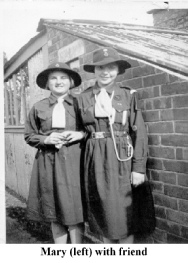 During my teenage years, I was in the girl guides. Our meetings were held in the WI Hut in Upwey. I always went with Rene Preston as the meetings were in the evening and she was a few years older; she always had a boyfriend to meet her and walk us home. I was made to walk in front of them and told not to turn around. I went to camp once at Carey Camp near Wareham; happy days and painful nights due to the biting mosquitoes. We had dances in the WI Hall in Upwey; I was only allowed to go with Lily when her mother went as well. I remember one dance at Portesham village hall, we all went out on the Abbotsbury Line and Mother and someone gave us a lift back home. That night a coachload of sailors came in very merry as they had a barrel of beer on their coach. That was a night of fun and laughter, but sadly we heard later that the submarine they were serving on had been sunk and all lives lost.
During my teenage years, I was in the girl guides. Our meetings were held in the WI Hut in Upwey. I always went with Rene Preston as the meetings were in the evening and she was a few years older; she always had a boyfriend to meet her and walk us home. I was made to walk in front of them and told not to turn around. I went to camp once at Carey Camp near Wareham; happy days and painful nights due to the biting mosquitoes. We had dances in the WI Hall in Upwey; I was only allowed to go with Lily when her mother went as well. I remember one dance at Portesham village hall, we all went out on the Abbotsbury Line and Mother and someone gave us a lift back home. That night a coachload of sailors came in very merry as they had a barrel of beer on their coach. That was a night of fun and laughter, but sadly we heard later that the submarine they were serving on had been sunk and all lives lost.
Several school mates got together to form a youth club, as we didn't have anything to do in the village. The first meeting was held in Roger's Dairy Garages at the top of Jesty's Avenue. We formed a committee and got things started with walks, cycle rides and tennis matches. I think this was my first introduction to being on a committee. After a while our meetings were held at Elvira Waugh's house at Redlands. I am still friends with her after nearly sixty years. Another friend from those days is Vena, who has sent me a card every year for my birthday and Christmas since we were at school together.
Over the years we had terrible floods from the river Wey at 7 Littlemead, as it was the lowest lying house in the road. I remember my father getting up at 5 o'clock to go to the farm, coming down the stairs and calling out the water is up three stairs. We first had to stay upstairs as everything downstairs was ruined, all the carpets and furniture. When the water subsided, it left thick mud everywhere. I stayed with an auntie for a few weeks until everything was cleared up and dried out. One Christmas this happened, my father opened the front door to go to work and the Christmas tree, which was floating in the room, sailed down the road in the flood.
While on holiday in 1939, war broke out and I didn't go back to school. I went and got myself a job at Wheelers Stationers and Printers in St Mary's Street, Weymouth. I was signed on for a three year apprenticeship which was very strict for the first six months. I was learning all the sizes of paper and envelopes etc, in the room upstairs where all the stock was kept. The staff were kind and helpful, some of them having to leave to do war work. The staff room upstairs where we put our coats was terribly dark and smelly. There was also a very old toilet, I don't think any of it was cleaned very often.
I was christened and confirmed at Broadwey Church, but as they had no Sunday School, I went to the Methodist Chapel and also sang in their choir. The Christmas parties are always in my thoughts, with a big Christmas Tree on the stage in the Temperance Hall with a lovely tea and a present for everyone. The choir was very good and formed a group to visit other churches and chapels in the area. We did sketches and sang, often dressed as countries of the world, I was an Eskimo.
My other grandmother was Mary Phillips, whom I was named after. She lived at Littlemoor near the New Inn. My Auntie Florrie, who was my godmother, looked after Les and also Uncle Jim who spoilt me rotten. Grandfather Phillips had died before I was born. Uncle Jim worked on a farm at Nottington when I was young and brought the milk in churns to Upwey Junction to go on the train. I often went with him in the horse and cart, as he bought me Fry's Cream bars from the slot machine on the station platform. Auntie Florrie was wonderful, looking after Grannie and Uncle Jim, she never married. She would hold a rope for me to jump over for hours when we visited. She also gave me a pair of scissors to cut the dead heads of the thrift plants out in the garden, the beginnings of my love of plants and gardening. We always had a lovely tea before going home.
During the war, when I was only about 16, we had Royal Engineer Soldiers billeted in the Reading Room at Broadwey, this had belonged to the church and was in the grounds where the Reynolds Institute is now.
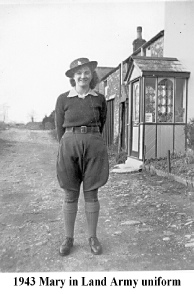 During January 1943 I had to do war work, so I decided to join the Women's Land Army and was made a member on the 22nd of February 1943. I had to go to Dorchester to a large house in Weymouth Avenue to collect all my clothes and they told me when to start work at Gills Poultry farm, which was on the farm where I lived as they had applied for me as their Land Girl.
During January 1943 I had to do war work, so I decided to join the Women's Land Army and was made a member on the 22nd of February 1943. I had to go to Dorchester to a large house in Weymouth Avenue to collect all my clothes and they told me when to start work at Gills Poultry farm, which was on the farm where I lived as they had applied for me as their Land Girl.
I started work in the sheds that held day old chicks, to be reared on for several weeks before being sold. They were then put in special cardboard boxes and taken to Upwey Junction to go on the train to their destination. All day old chicks were sent by this method on trains straight from the incubators which held the eggs for several days before hatching out. During the early days of the war, they had a Japanese man who sexed all the chicks as soon as they were hatched. But he was later put in a prisoner of war camp, when we entered the war against Japan. I worked with Frank Cornick and Betty King who later married Frank's son when he returned from being a prisoner of war in Germany. The farm where I worked also was a dairy farm where my father worked bottling milk and during the summer my mother did haymaking, usually on the cart with the men, pitching forkfuls of hay up to her, no bails of hay in those days. All loose hay was put into barns or made into ricks in the field. Just before the D Day Landings in France, we had American soldiers arrive on the farm, they were billeted in tents. I remember my mother cooking bacon and egg suppers for about six of them. We always kept chickens, so had plenty of eggs, but they brought the bacon and other items that were rationed at the time. I can see my father now, in the evenings with a bottle of cream in which he had skimmed off the milk, shaking it for hours until it had turned into butter and then working salt into it for a better taste. Lovely on my morning toast after so much margarine.
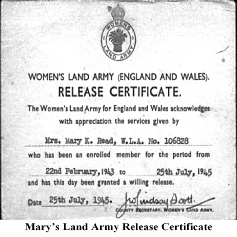 My mother, myself and a young man called Donald Mintern, who lived in Mill Street, did fire watching one night in St Nicholas School, Broadwey, opposite the church. I don't know what we would have done if incendiary bombs had been dropped on the church or school as we only had a stirrup pump and buckets of water and sand. We had two camp beds, so we had to take it in turns to get a few hours sleep. I stayed in the Land Army until the 25th July 1945. I still have my release certificate and I remember my number, 106828.
My mother, myself and a young man called Donald Mintern, who lived in Mill Street, did fire watching one night in St Nicholas School, Broadwey, opposite the church. I don't know what we would have done if incendiary bombs had been dropped on the church or school as we only had a stirrup pump and buckets of water and sand. We had two camp beds, so we had to take it in turns to get a few hours sleep. I stayed in the Land Army until the 25th July 1945. I still have my release certificate and I remember my number, 106828.
I met my first husband Charles Read during 1941, when he was stationed in a house on Dorchester Road at Redlands. He was in the Bomb Disposal unit of the Royal Engineers, a very dangerous job. Although Charlie was stationed away, he visited Broadwey many times whilst on leave. We decided to get married on 8 December 1943 at St Nicholas Church, Broadwey, as he was soon to be sent abroad. What a day, it poured with rain, I had a white wedding as a dear old friend of my mothers gave me the clothing coupons to buy the dress. The wedding reception was held in the Swan Hotel in Broadwey. It wasn't a very big room and we had to really squeeze the guests in. Our honeymoon was spent with Gran & Grandad Guppy at Yetminister. We couldn't go far due to the war and a lack of money. I remember going on the train after the wedding, the train was packed with soldiers going on leave; getting into the carriage full of troops, granny announced that "these two have just got married", imagine our blushes. After our honeymoon, Charlie went back to the army and was sent to France and later Germany. He came home on leave a few times before finally returning to England at the end of the war. I was still in the land army and living at home with Mum and Dad.
Sydney James, my first son was born in September 1945 at home with my parents at 7 Littlemead. When Charlie was demobbed, he got a job on a farm at South Buckland and we went to live in a farm cottage, No. 2 Pear Tree Cottage, in the village of Nottington. The Farm belonged to a Mr L Gale. I remember those early years as a young wife and mother; Olive Gale, the farmer's daughter delivering milk to the village in pails to the door and then ladling it into one of our jugs on the doorstep. After Olive gave up delivering milk, a farmer from Wyke Regis came each morning. We didn't have much furniture as it was utility furniture only, we had coupons to buy a bed, chair and dressing table etc. I remember we had no covering on the upstairs wooden floors, so Charlie started making rag rugs out of old coats etc. In later years he did lovely rugs with ready cut kits, I am still using some of those mats after 56 years. I cooked on a kitchen range fuelled with coal and wood. The first cake I made and cooked in the oven was a disaster. It looked lovely from the outside, but had not cooked in the middle. So I ran into the garden and hid it in the hedge. Yes, Charlie found it later that week and brought it down to me. I didn't try cakes again until we had an electric cooker.
Peter, my second son was born only 16 months after Sydney, so I really had my hands full. My Mother and Father were a great help and also my uncle Jim Phillips, who lived in the cottage at 6, Littlemead. They helped in lots of ways, providing us with clothes, sweets and toys etc. The wages for a farm worker in those days was about £3.50 per week. The house, however, was rent free, as was milk; but usually by Thursday, I was waiting to draw the family allowance of eight shillings from the Post Office so I could buy something from the butchers for our dinner. It was about a two mile walk to get to the shops but I had a twin pram bought by my mother as she said it was not right for Sydney to be sat out in the cold and rain at the end of a small pram. It was not easy when the boys started school, as it was along walk to St Nicholas School, but the family between them, bought two bicycles for them and in later years, larger ones which they left at Elsie Strong's house on the Dorchester Road and collected in the afternoon to come home.
When the boys were about 7 years old and at school all day, I started going out to work for a few extra shillings. My first job was house cleaning for Mrs Oakford in Jesty's Avenue. Later I did two afternoons a week for Mrs Gorden-
Later during the summer months I went to a Mrs Birchenough in Radipole as she took summer visitors. I cycled to work, but always tried to get home before the boys got home from school. The evenings were spent in the summer gardening, with Charlie and the boys playing football in the fields with our dog, Patch. We often went to watch Upwey & Broadwey football team either at home at the Plot in Upwey, or away with the team in their coach to different parts of Dorset. No television in those days, only the radio for entertainment during the winter evenings.
When we went to live at 9 Old Station Road, the boys started early morning paper rounds. We had a small back garden and erected two greenhouses as Peter was so interested in gardening. We also had an allotment on the Friar Waddon road, and a small piece of Mrs Thoyts' garden at Westbrook House, in Church Street.
About 1958, Charlie left the farm at Nottington and went to work at Westbrook Farm in Upwey for Mr Comben, working there for many years. When Mr Comben retired and sold the farm, Charlie went to work for Weymouth Parks Department. Sadly Charlie became ill and died in January 1974, aged only 54.
Life continued at Old Station Road, I joined the Broadwey & Upwey Horticultural Society showing fruit, vegetables and flowers.
After Charlie died I joined the Women's Institute, which was held in the Memorial Hall (which was a blessing as I made lots of friends and it helped me over a very sad period). I remember joining in the September and by November at the Annual General Meeting I was elected on to the committee and have been a member now for 33 years. I have been President four times and started the Annual Flower and Craft show 20 years ago.
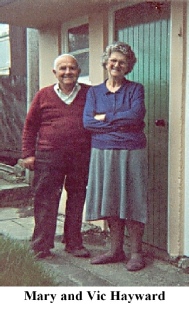 Through my interest in flowers I exhibited in local shows, at one show in Wyke Regis
Through my interest in flowers I exhibited in local shows, at one show in Wyke Regis
I was introduced to Vic Hayward. We started a friendship and in 1979 we decided to get married and spent many happy years together.
I carried on with my craft work etc and with the Upwey Society started craft shows and sales every year in the summer and at Christmas. These were held in the Upwey Village Old School hall. I am still creating and selling my craftwork to this day. It keeps my mind and body active as I am now getting older.
I was asked if I would start a flower arranging class in the village to run during the evenings. I hired a room in the Memorial Hall and started the class with a few friends. Later more and more people wanted to join, we had to move the class to a larger room in the hall. We are still meeting once a month, even now after 20 years. Over the years we have done many flower festivals, mostly in Bincombe church. The best of these, I think was a wedding theme with brides and bridesmaids dresses and a lovely wedding cake loaned to us by Weymouth Bakery on Lodmoor Hill. The cake was decorated with lovely icing flowers and a miniature bride and groom on top. Imagine our surprise when we opened up one morning for the festival visitors and found a mouse had nibbled the icing around the top of the cake. We donated the money raised to acharity and Bincombe church. Mr and Mrs Tewkesbury were a great help, holding coffee mornings in their garden to raise funds to purchase flowers.
My son Peter opened a florist shop in what used to be the bakery on Dorchester Road and when my grandson Mark left school he joined his father as he is a natural flower arranger. The business has grown over the years, I am sure because of the high standard of the work and it is now located in a larger premises in Broadwey (formerly Sutcliffe's the chemist). The business is still going strong and also employs four girls in a part time capacity.
April 2004 -
I am back on the Women's Institute Committee once again, Secretary this time as no one else would do it. I am also the Show Secretary, so there will be plenty to get on with this year. Keeps my brain working.
Sunday May 8th 2005, I am waiting for Helen and Adrian to come and take me for a ride in the country, when a knock came at the door. It was a man in a peak cap and blue uniform. He greeted me by saying "Mary Hayward, I have come to take you for a ride". He had a vintage car, my friend Pauline and I went with him. He took me down Nottington Lane, all out into the country and back round to Portesham and then onto Upwey. When we got near to the wishing well, I said "look at all the cars and people near the church, there must be something on. He pulled the car across the road by the old school and Mark greeted me with a bouquet of flowers and lots more people were waiting for me in the Wishing Well Tea Rooms. What a surprise, the family had arranged this for my 80th Birthday on the 9th of May.
We all had a lovely time with friends and relatives, some from years ago and some who I had worked for. Dr & Mrs Down, Sue Ward, Georgina, and friends from the WI, Floral Group and Horticultural society. We then went into the garden and had many photographs taken and enjoyed a delicious tea and talk to all my friends. A day never to be forgotten.
Mary Hayward (nee Phillips) 1925-

